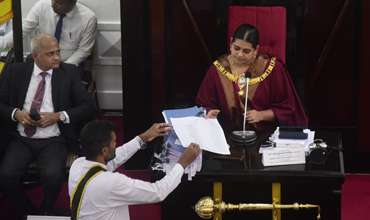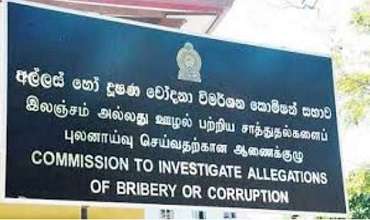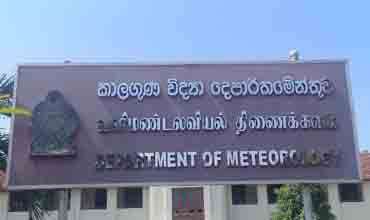FEATURE: Problems facing the construction industry
By Lalith Hettiarachchi
It is no secret that the economy is undergoing a challenging period. The manufacturing industry in particular, although quite a regulated industry is adversely affected due to the added restrictions imposed by health authorities, in order to minimize the effect of COVID-19, to be adhered by the industry. The apparel and tourism industries from which the government expects the most foreign exchange contribution are among the worst affected. The construction industry is one other with a considerable workforce both skilled and unskilled depending on this sector for their livelihood.
Most of the problems faced by the construction industry however, are not common or not comparable with those of the other two as above mentioned. One has to admit that almost all the high value construction projects of recent times have come from the state sector. Except for a few small projects, which were funded under multilateral or bilateral funding arrangements and had been offered on competitive bidding subject to Asian Development Bank or World Bank standard bidding procedure, the others were unsolicited projects given to handpicked contractors local or foreign or combinations of both.
On the other hand, almost all the high value projects of the state sector of the recent past have been offered under bilateral negotiations with friendly states, for example China. Some of the earlier projects, were taken over by Chinese companies, as the funds had been offered by the Chinese government, and therefore the local companies could only work as subcontractors to the Chinese companies.
It was with great pressure to the authorities in power, that the construction companies that were in the front line got together under consortiums formal or otherwise, to take over the more recent projects and execute them. Unfortunately, halfway through the execution of the project/s the economy received the cruel shock of the Easter Sunday bomb explosions. Within a couple of months came the Corona shock with its first wave and now the second.
The construction industry by this time was forced to depend on bank guidelines far too much for the execution of those projects taken over by the several companies on “negotiated terms”. As it is widely known by the industry these “negotiated terms” were restrictive and skewed in such a way that a substantial margin of the profit expected by the local subcontractors got eroded to satisfy other interests not so much related to the contracts.
The contractor companies came to be under the mercy of banks depending on loans, leases, overdrafts, guaranties and as last resorts on temporary overdrafts too. In short, the contractors have nowhere to go at the present moment.
Going on the basis of attracting FDIs, promotional attempts have been made and are being made by some of the big contractors to find joint venture partners or joint investors for oncoming projects in the pipeline. But so far none of those attempts has yielded any substantial results mainly due to associated travel restrictions and risks. With the recent downgrading of the country credit rating the international business world does not appear to be fully convinced about the future economic prospects in the country although some heads of state and visiting high ranking state sector authorities hide their concerns behind diplomatic jargon.
The offers made to help the SMEs by concessionary short and long-term loans by the local banking sector on the lines associated with the Central Bank (CB) directives may have satisfied the thirst of some of the SMEs. But the big time construction industrialists are literally left high and dry.
On the other hand, the banking sector cannot ignore the heavy exposure of the individual construction companies. Therefore, the banks have now started to apply their normal tools on which they rely to verify the profitability, return on investment and sustainability of the contractors coming to them for funding arrangements before they make up their minds to come to assistance. The moratorium given to some of them is to end shortly without an alternative or any option offered for the industry to move forward.
We certainly agree that the CB has to take adequate safeguards to see that the banking sector does not get overcharged and collapse. But some of the commercial banks have now started to go into greater details of how and where the credit offered by them so far has gone or is going as if the industrialists are suspects of criminal acts! In short this means that the feasibility of each past credit obtained is analyzed and verified in detail before a bank decides to offer any more credit. The industrialists applying for credit therefore, have to be waiting indefinitely until the banks satisfy themselves about the past usage of credit to get them qualified for more funds!
One of the other insurmountable problems that the industry is faced with is the retention of the staff. The statutory payment on staff salaries is payable in any case to avoid being surcharged by the authorities for late payment and/or default.
Even though allowances to staff may be paid in arrears, salaries have to be settled within a reasonable period and the statutory payments based on the salaries and allowances necessarily have to be duly remitted to the authorities. There are instances of additional grace periods being obtained for settlements to be made for short periods. But they are not at all adequate to balance the cash flows.
Payments on certified invoices due to contractors on most state sector projects taken on negotiated terms, are in arrears for several years in some instances. This means that the contractor companies have to be paying bank interest for money, which could have been avoided if only the state sector monies were forthcoming at the proper time.
Some of the projects which are at the final phase nearing completion are on hold incurring overheads for want of money that is required to purchase urgent raw materials and services from subcontractors. Almost all suppliers have frozen their credit lines. If at least the certified invoices were settled by the clients at the proper time the projects could have been finished, thus avoiding recurring overhead expenditure and loan and overdraft interest to banks.
While the private sector projects like an apartment complex or a holiday resort has been selected by a client to invest based on proper feasibility studies, the specially selected projects by the state sector have been identified for execution purely for development purposes. Such projects simply because they come under the category of FDIs had got selected without any feasibility studies done.
The construction of a highway is certainly very important for the country for purposes of economic development. But one has to admit that the return on investment on such a project is long and slow perhaps extending to the next generation. On the other hand, the public sector has to pay commercial rates of interest.
While in most of these cases the gestation period of a project is high, the grace period is short. Therefore, the government as the client is caught up in a situation where the Rupee has depreciated by leaps and bounds and repayment of capital too has got added to Treasury expenses. No government can possibly deviate from continuing the welfare measures traditionally being offered to the not so well to do people of the country.
There is no doubt that withdrawal of import duties or reduction of tax regimes have been introduced by the government to help the business sector by way of incentives. Unfortunately, the heavy borrowings in the recent past have added to the capital repayment and interest payments, which have to be met as priority payments by the Treasury.
The government in addition had no option than to dole out monies on other welfare activities to the poor in the wake of the COVID-19 outbreak. No one could have predicted this development which is affecting the whole world. The contractor companies on the other hand have had to bear the added costs of imported materials and the rising costs of labour during a prolonged execution period, which had already eaten up the expected/targeted profits by the time the project/s ended.
The CB has to take into consideration the macroeconomic situation in the country and give timely directives to the banking sector in order not only to save the sector from getting overheated but enabling the sector to offer sustainable solutions to the industry rather than making their life more difficult at this critical moment.
The future for the industry in general appears to be challenging. Especially with the Coronavirus outbreak, the manufacturing industry is under a handicap. Those export-oriented industries like the garment industry will feel the pinch over a long period. This means that direct tax income to the government will fall further short of budget expectations.
On the other hand, being so much dependent on imports for our daily consumption needs in the household, the government is not in a position to raise import taxes on essentials. The fraction of the daily needs of a household that can be substituted by local produce is too small to make a real impact.
The current measures taken by the government to give incentives and to help local industries in certain areas that had been so far neglected have taken off well. But it needs more and more support to bring them up to import substitution level to make them sustainable.
The government has necessarily to see how best it can balance the budget of the next few years to see some light at the end of the tunnel. It has got to necessarily depend much on low interest and long grace periods for repayment from World Bank, International Monetary Fund or the Asian Development Bank funding for any development projects.
In the meantime, as much as possible while import substitution has to play an important role, whether one likes it or not, in addition to frugal living, domestic savings have to be encouraged so that local investor strength has to be boosted up.
(The writer is a retired public servant with over 40 years of service and is currently the director of a private construction company)
-
Still No Comments Posted.

















Leave Comments